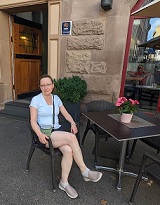Can a Cohen extension have an $\omega_1$-sequence of successively more generic Cohen reals?
A forcing extension $V[g]$ by the Cohen forcing ${\rm Add}(\omega,1)$ has continuum many Cohen generic reals. Indeed, as Joel Hamkins explains in this Math Overflow answer, a Cohen extension has a perfect set of Cohen generic reals such that any two finite subsets of them are mutually generic. Since adding a Cohen real is isomorphic to adding $\omega$-many Cohen reals, a Cohen forcing extension also has countable sequences $\langle r_n\mid n\lt\omega\rangle$ of Cohen reals such that for every $n\lt\omega$, $r_n$ is Cohen generic over $V[\langle r_i\mid i\lt n\rangle]$. Can we push this to obtain a sequence $\langle r_\xi\mid\xi\lt\omega_1\rangle$ such that for every $\alpha\lt\omega_1$, $r_\alpha$ is Cohen generic over $V[\langle r_\xi\mid\xi\lt\alpha\rangle]$? This question arose out of my work with Richard Matthews on ${\rm ZFC}^-$-models and we were stumped on it for some time. My intuition was that the answer should be yes; after all, we are not asking that the sequence is generic for an $\omega_1$-product of Cohen reals. It turns out that Andreas Blass already solved the question years ago and my intuition was all wrong!
Theorem: (Blass [1]) A Cohen forcing extension cannot have a sequence of Cohen reals $\langle r_\xi\mid\xi\lt\omega_1\rangle$ such that for every $\alpha\lt\omega_1$, $r_\alpha$ is Cohen generic over $V[\langle r_\xi\mid\xi\lt\alpha\rangle]$.
The proof sketch I give here is my modification of Blass's proof which will allow us to generalize the argument to the forcing ${\rm Add}(\kappa,1)$, adding a Cohen subset to $\kappa$, for an inaccessible $\kappa$.
Proof:
Let $\mathbb B$ be the Boolean completion of ${\rm Add}(\omega,1)$. In particular, $\mathbb B$ has a dense subset of size $\omega$. Now suppose that a forcing extension by $\mathbb B$ (equivalentely ${\rm Add}(\omega,1))$ has a sequence $\langle r_\xi\mid \xi\lt\omega_1\rangle$ of Cohen reals such that for every $\alpha\lt\omega_1$, $r_\alpha$ is Cohen generic over $V[\langle r_\xi\mid\xi\lt\alpha\rangle]$. The model $V[\langle r_\xi\mid\xi\lt\omega_1\rangle]$ is a generic extension of $V$ by a complete subalgebra $\mathbb D$ of $\mathbb B$ by the Intermediate Model Theorem of Solovay [2]. Let's argue that $\mathbb D$ also has a dense subset of size $\omega$. Given a condition $p\in {\rm Add}(\omega,1)$, let $q_p$ be the infima of $b$ in $\mathbb D$ such that $p\leq b$. Each $q_p$ is in $\mathbb D$ by completeness and the conditions $q_p$ are dense in $\mathbb D$. Let $\dot R$ be a $\mathbb D$-name such that it is forced by $1$ that (1) $\dot R$ is an $\omega_1$-sequence of successively more generic Cohen reals and (2) the extension by $\mathbb D$ is equal to the extension $V[\dot R]$. Then it is easy to see that the Boolean values $[[n\in \dot R(\xi)]]$ for $n\lt\omega$ and $\xi\lt\omega_1$ must generate $\mathbb D$. Next, observe that since $\mathbb D$ has a countable dense subset, there must be some $\alpha\lt\omega_1$ such that $\mathbb D$ is generated by the Boolean values $[[n\in \dot R(\xi)]]$ for $n\lt\omega$ and $\xi\lt\alpha$. But this means that if $V[G]$ is $\mathbb D$-generic, then $G$ can be recovered from the sequence $\langle R(\xi)\mid\xi\lt\alpha\rangle\, (R=\dot R_G)$, which contradicts that $R(\alpha)$ is $V[\langle R(\xi)\mid\xi\lt\alpha\rangle]$-generic. $\square$
The proof easily generalizes to give the following result for an inaccessible cardinal $\kappa$.
Theorem: A forcing extension by ${\rm Add}(\kappa,1)$ cannot have a sequence, $\langle A_\xi\mid\xi\lt\kappa^+\rangle$ of subsets of $\kappa$ such that for every $\alpha\lt\kappa^+$, $A_\alpha$ is ${\rm Add}(\kappa,1)$-generic over $V[\langle A_\xi\mid\xi\lt\alpha\rangle]$.
I don't know whether the result holds for every regular cardinal $\kappa$ because the current argument relies on $\kappa^{\lt\kappa}=\kappa$.
Question: Does the above result hold true for any regular cardinal $\kappa$?
Question: Can Blass's theorem be proved using partial orders without reference to Boolean algebras?
References
- A. Blass, “The model of set theory generated by countably many generic reals,” J. Symbolic Logic, vol. 46, no. 4, pp. 732–752, 1981.
- S. Grigorieff, “Intermediate submodels and generic extensions in set theory,” Ann. Math. (2), vol. 101, pp. 447–490, 1975.
